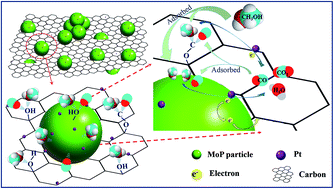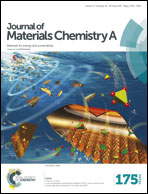Enhanced methanol oxidation and CO tolerance using oxygen-passivated molybdenum phosphide/carbon supported Pt catalysts†
Abstract
To improve the sluggish kinetics of the methanol oxidation reaction (MOR), one efficient way is to improve the properties of catalyst supports to enhance the activity and durability of Pt-based catalysts. In this study, molybdenum phosphide/porous carbon (MoP/C) composites as Pt-supports and co-catalysts for the MOR are prepared by varying the molar ratio of citric acid (CiA) to glucose (Glu). Pt–MoP/C-2 (CiA : Glu = 2) has far higher electro-catalytic activity (platinum electrochemical surface area and mass activity) and durability for the MOR than commercial Pt/C. Because of the close integration between MoP and carbon and the ligand effect of Mo–P bonds, MoP/C can maintain a commendable stability for facilitating the fast transport of electrons. A fast oxidative removal of CO can reduce the adsorption of poisoning species (CO and CHO) onto the surface active sites of Pt and lead to the regeneration of active sites in Pt–MoP/C. Furthermore, the surface of MoP/C contains abundant absorbed –OH (hydrophilic) and oxygen-containing functional groups originating from the O2 passivation, which promotes the dispersion of deposited Pt and the mass transfer of fuel. This study provides useful information for the design and preparation of a state-of-the-art anodic electro-catalyst support with promising co-catalytic effects for the MOR.


 Please wait while we load your content...
Please wait while we load your content...